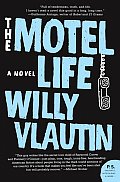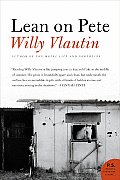[
Editor's Notes: Click here for an excerpt and photos from Matt's newest book, Gimme Refuge: The Education of a Caretaker.
Willy Vlautin will appear at Powell's City of Books on Tuesday, April 27th at 7:30 p.m. (
Click here for details).]
 A few months ago I fell into a deep depression over the loss of my great dog, Ray. I wasn't sleeping much and was sort of sleepwalking through my teaching job. Beach walks, my usual foolproof antidote to depression, left me even more depressed because Ray had always accompanied me.
A few months ago I fell into a deep depression over the loss of my great dog, Ray. I wasn't sleeping much and was sort of sleepwalking through my teaching job. Beach walks, my usual foolproof antidote to depression, left me even more depressed because Ray had always accompanied me.
At some point I put on Richmond Fontaine's latest CD, We Used to Think the Freeway Sounded Like a River. Portland's Richmond Fontaine has graced the Pacific Northwest rock scene for 15 years, turning out one impressive album after another and relentlessly touring the country and Europe. They are hands-down my favorite Oregon rock band.
Fontaine is led by its singer and main songwriter Willy Vlautin, who also happens to be one of my favorite novelists, with the gritty The Motel Life and Northline to his credit. These are two of the freshest and most unpretentious American novels I've read in years. I've recommended them to everyone, especially people who have stopped reading fiction because they've been punished by dense, opaque, and virtually plot-free novels.
A few months earlier, after reading an excellent review of We Used to Think the Freeway Sounded Like a River, in the New Yorker of all places, I listened to it once but nothing really registered.
This time was different.  In short order, I became totally lost in the songs, their Pacific Northwest landscapes, down-and-out Steinbeck characters, honest and plaintive narratives, and alt-country-tinged arrangements. (I think I even heard a Theremin!) I played the album repeatedly and now know it by heart. My favorite track on We Used to Think the Freeway Sounded Like a River is a wistful spoken word performance titled "A Letter to the Patron Saint of Nurses," the last song on the record. I love this line from it: In a motel room at the coast / going to see Lou Rawls at some Indian casino.
In short order, I became totally lost in the songs, their Pacific Northwest landscapes, down-and-out Steinbeck characters, honest and plaintive narratives, and alt-country-tinged arrangements. (I think I even heard a Theremin!) I played the album repeatedly and now know it by heart. My favorite track on We Used to Think the Freeway Sounded Like a River is a wistful spoken word performance titled "A Letter to the Patron Saint of Nurses," the last song on the record. I love this line from it: In a motel room at the coast / going to see Lou Rawls at some Indian casino.
I can't really explain why, but listening to this record shook me out of the depression. Music can do that in a way that reading can't. So thanks for that, Richmond Fontaine.
Time for some personal disclosure: Willy Vlautin is a friend of mine and we've collaborated on a few cool projects, with more to come. On April 9th we're co-headlining Homeword Bound, a literary benefit in Tualatin for Community Partners for Affordable Housing (for more information go to www.cpahinc.org). We'll be joined by Debra Gwartney, April Henry, Bart King, Jeff Mapes, Naseem Rakha, and other writers to raise money for an important cause that's dear to my heart. I teach English and creative writing at Newport High School in Lincoln County on the Oregon Coast, one of the most economically depressed counties in the state. In the last two years, I've witnessed the ravages of homelessness and a lack of decent housing upon many Newport High School students. Really, the number is shocking, criminal in my mind. We've got kids living in motels, vans, cars, and even tents in a nearby state park. So many are going hungry.
Willy was kind of enough to help out my teaching by persuading his publisher to donate a class set of The Motel Life to Newport High School. I'll teach it later this spring, but I've handed the book out to a few students and they all return it the next day — finished.
 Willy has a new novel out, Lean on Pete, set in Oregon, the story of a virtually homeless 15-year old boy, Charley, who finds work at the Portland Meadows Racetrack. There, he forms a friendship with an aging racehorse named Lean on Pete and later takes desperate measures to save the horse and reconnect with his only living relative. The action unfolds in Portland and Central/Eastern Oregon and contains some haunting and flinty imagery of these places, particularly Portland Meadows.
Willy has a new novel out, Lean on Pete, set in Oregon, the story of a virtually homeless 15-year old boy, Charley, who finds work at the Portland Meadows Racetrack. There, he forms a friendship with an aging racehorse named Lean on Pete and later takes desperate measures to save the horse and reconnect with his only living relative. The action unfolds in Portland and Central/Eastern Oregon and contains some haunting and flinty imagery of these places, particularly Portland Meadows.
I won't tell you how it all ends, but if you've read only a few pages of Willy's previous novels, then you know hard things will happen to the characters and they will face difficult tests, usually alone.
I thoroughly enjoyed Lean on Pete and loved Charley's character, who seems to be lifted from another era. He has no phone, no iPod, no gadgets of any kind, and watches old movies on analog television sets. He's street-smart but also has a huge heart. I wish I had him in my class.